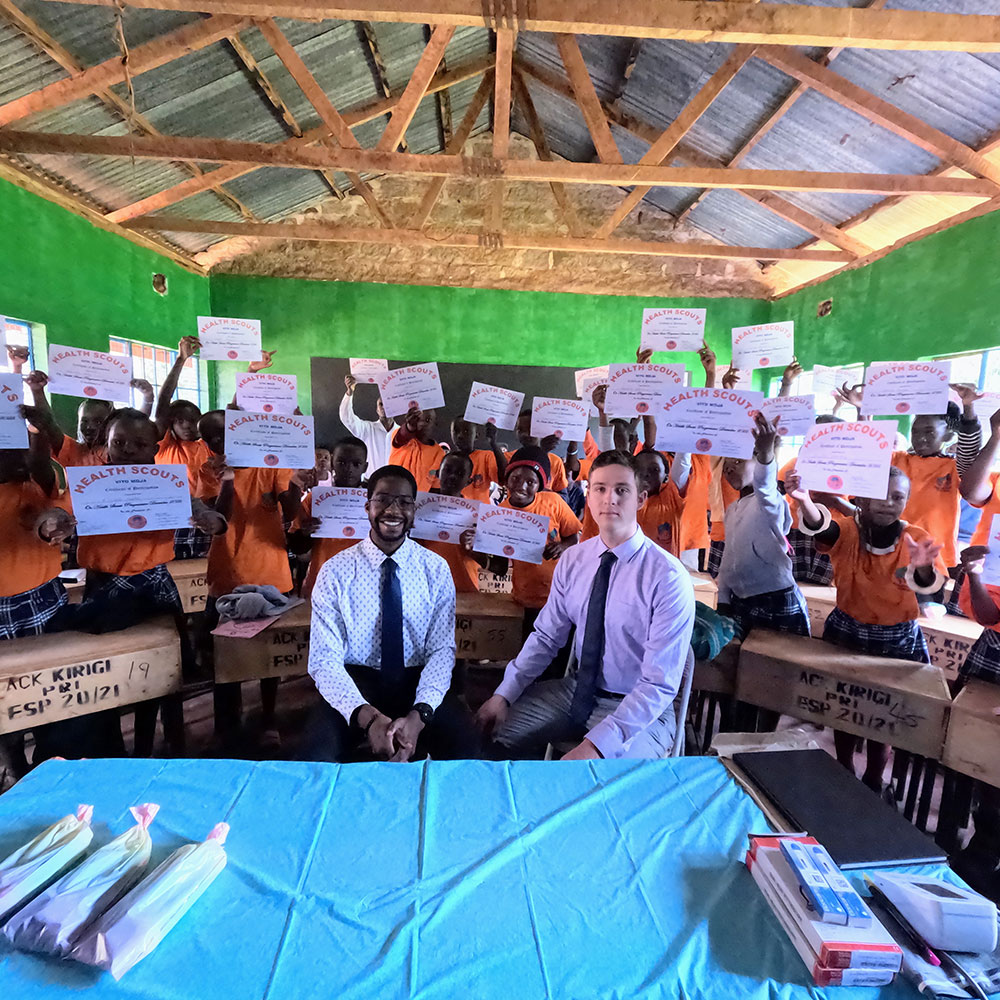
Former health coaches team up to improve health outcomes and education in African communities

The dedication to health sciences runs deep for Eran Maina ’21 and Scott Perkins ’20. The biochemistry & molecular biology and neuroscience majors, respectively, met while working on the weekends in neighboring science labs at The College of Wooster. Since then, they have organized yearly trips during medical school breaks to teach in Kenya for the health education initiative they co-founded as undergrads in 2019.
Their Vito Moja Health Scouts program exists to better the health of Maina’s ancestral village and surrounding communities in Kenya as rapid modernization has led to the adoption of less healthy commercial Western foods and less active lifestyles. As access to fried foods increased in Kenya, so too has chronic illness. “In the states, we take for granted that eating vegetables is better than fried chicken,” explained Perkins. “As Kenya becomes more urbanized with restaurants like KFC, the country is seeing more diabetes and heart disease than ever.
The pair set out to create a program that supports the community in two ways: By building knowledge about chronic illness, and by motivating and inspiring kids in rural villages to stay in school (with encouragement toward careers in health). For Maina, it’s a continuation of the work his family’s nonprofit, Vito Moja, has done to empower the youth of Kenya since 2007.
“Vito Moja means ‘one gem’ in Swahili and refers to my mom who started the nonprofit by building 18 libraries and donating more than 200,000 books and extra school supplies across Kenya,” said Maina. “As chronic illness is expected to surpass infectious disease as the leading cause of death in Kenya by 2030, we saw an opportunity to continue spreading knowledge through the nonprofit, with a new focus on how people can take better care of themselves.”
Health Scouts is inspired by the Health Coach Program, a partnership between The College of Wooster and Wooster Community Hospital that connects patients to students who work closely with the hospital’s physicians, offering a Community Care Network. “We served as doctors’ eyes and ears in homes of chronic disease patients who were falling through the cracks of the health care system,” explained Perkins. After a collaborative training with area medical professionals, the students could check blood pressure, blood sugar, weight, and medicine boxes to ensure patients were properly taking medication.
“I met with one or two patients per week as a health coach and recall helping one woman go through her fridge and cabinets to help her switch to a more diabetic-friendly diet,” Maina said. “I was astounded how these kinds of efforts made such a significant impact on the health of the surrounding community.”
While health coaching reduces rates of emergency room visits in Wooster, it also creates graduates who are better-prepared health care professionals. Recurring classmates Maina and Perkins are now both studying to become physician scientists at Cleveland Clinic Lerner College of Medicine of Case Western Reserve University. “My Wooster experience made me realize I wanted to attend medical school, and it allowed me to see that I didn’t have to wait until I was a physician to begin making an impact in the communities I’m a part of,” said Maina.
The Wooster grads have traveled to Kenya four times to teach 12-to-15-year-old students a simplified curriculum about a variety of topics like heart disease, stroke, diabetes, hygiene, and mental health. They host a closing ceremony to showcase what the students learned for parents, teachers, government officials, and community partners. The students are awarded certificates and return home as health scouts to enlighten their families and neighbors to fill the health-knowledge void.
“We’ve benefited from Vito Moja’s connections in the community, which allow us to understand cultural dynamics and what the community truly wants,” said Perkins. “Every step of the way we are working with area partners to ensure a sustained and lasting impact.” Because of this intentionality, kids show up excited to learn, and more schools want in on the program.
Maina and Perkins both emphasized the caliber of mentorship and skills from extra curricular activities from peer tutoring to musical ensembles that they appreciated while at Wooster, and it’s easy to see how they have channeled these experiences into their work with the Health Scouts program in Kenya. From James West, professor of biochemistry and molecular biology, who Maina credits for making his path to medical school possible; to Mark Snider, Robert E. Wilson Professor of Chemistry and Biochemistry, from whom Perkins took the confidence and training to begin with a big idea, make a plan, and jump in … even if that big idea seems a bit scary. “Wooster is truly a college that changes lives,” Maina added.
Featured photo: Around 35 students from Kirigi Primary School in Embu, Kenya, show off their Health Scouts certificates in December 2022. They’re part of the more than 100 scouts who have completed the program to date.
This article originally appeared in the Spring 2024 edition of Wooster Magazine.
Posted in Alumni, Magazine on March 25, 2024.
Related Posts
Related Areas of Study
Neuroscience
Psychology, chemistry, philosophy, computer science, and other disciplines combine in the study of the nervous system
MajorBiochemistry & Molecular Biology
Biology and Chemistry combine in an interdisciplinary program for students with a passion for molecular events.
Major

